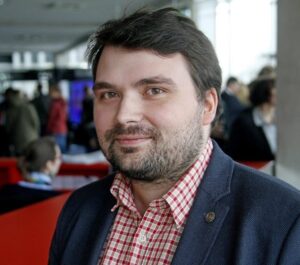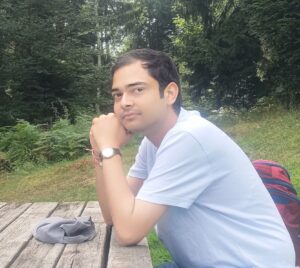A team of ECIU University students, including a KTU student, have completed an outstanding challenge – they have created a plan to help reduce the carbon footprint (CO2) for a Lithuanian company. The results of the sustainability plan for Scania Lithuania can be used to reduce CO2 emissions for other companies and organisations in the country.
The ECIU University consists of thirteen innovative European universities. Kaunas University of Technology (KTU) is a member of the ECIU consortium and is cooperating with businesses, public organisations and municipalities to provide real-life challenges for students Scania Lithuania provided a challenge to reduce the company’s CO2 footprint.
Lack of sustainability examples in Lithuania

The mentor of the student team, KTU lecturer Dr. Benas Gabrielis Urbonavičius, says that sustainability is a popular topic in the public media, so it is easy to find information about its basic principles. However, there are not many specific examples that could be applied in the Lithuanian companies’ context. As a result, the ideas presented by students are important not only for Scania Lithuania but also for other companies which care about sustainability.
“The student team solved the problem creatively by coming up with a range of proposals, from fuel saving to electricity generation. The models made by students could be a significant help for many Lithuanian companies to reduce their environmental impact. At the moment, we are also planning to implement the printing optimisation solution proposed by the students in one of the KTU faculties,” says the KTU associate professor.
According to Dr. B. G. Urbonavičius, the main advantage of the CO2 footprint reduction package is its versatility. The students understand the importance of current global issues and the company’s employee’s impact in reducing CO2 emissions.
“A motivational system was set up to reward employees for reducing their negative environmental impact: saving electricity, office supplies and fuel. The students were aware of the unstable prices of energy resources. Therefore, they integrated a plan for the installation of solar cells. The team of students presented the payback of the solar park, considering the solar intensity patterns in Lithuania,” says B. G. Urbonavičius.
According to the KTU associate professor, the atmosphere at ECIU University allows students to reach unique solutions: “The team members of this challenge were from different universities and studying different engineering fields. The students have applied their knowledge to achieve a common result, which made the sustainability plan comprehensive.”
The proposed plan is a step forward
This challenge is the first one Scania Lithuania has presented to ECIU University. Darius Snieška, regional manager of Scania Lithuania, says that this is not only a great way to find solutions for real-life problems, but also to develop professionals who are attractive to employers.
“First of all, it was useful for us to get to know our potential employees and future leaders. Secondly, the suggestions made by the team are relevant, and we will implement at least some of them over the next 2-3 years,” says D. Snieška.
The company’s representative emphasizes that the plan will help Scania Lithuania take a meaningful step forward toward sustainability.
“The CO2 footprint reduction package developed by this team is particularly useful as it offers a step-by-step evolution in several of the company’s sustainability processes. These projects will help us to take a solid step forward,” says D. Snieška.
According to the regional manager of Scania Lithuania, the ECIU University Challenges are an excellent environment for business and higher education to collaborate: “Businesses get useful advice from students, and students from business. We plan to continue our cooperation with KTU in the ECIU University challenges”.
The international student team’s experience

Team members who solved the challenge are Nora Jaredson and Jonathan Raecke from the National Institute of Applied Sciences (INSA) in France, Shubam Rajora from KTU and Alexis Vallee from the University of Stavanger in Norway.
KTU student S. Rajora, says that taking part in the challenge has not only given him useful knowledge but also changed the way he thinks.
“Every time I see inefficient devices that waste energy, I immediately think of ways to solve this problem,” says the KTU student.
According to the student, solving the challenge helped him to develop highly important competencies.
“While working on the challenge, I gained experience in teamwork, time planning, creative thinking and presenting ideas. This way of learning was fun and I will definitely take on other ECIU University challenge. I encourage all students to try this unconventional way of learning that forces you to step out of your comfort zone”, says S. Rajora.